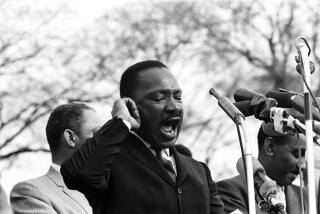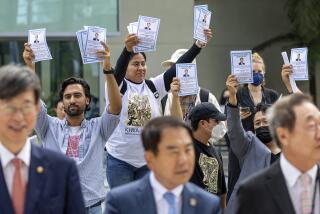Did Obama embrace Occupy movement in Kansas speech?
On a day when President Obama explicitly sounded the alarm on rising income inequality in the United States in a speech in Kansas, protesters in Washington chose action over rhetoric, disrupting a fundraiser for House Majority Leader Eric Cantor.
As part of the “Take Back the Capitol” movement that has descended on the capital this week, protesters stood outside a tony D.C. restaurant, giving the business to lawmakers and lobbyists who tried to enter and chanting “We are the 99%!” They also crashed a steakhouse fundraiser for GOP Rep. Sam Johnson of Texas. (Watch videos below.)
The weeklong protest, a variant of the Occupy movement, on Tuesday involved sit-ins at congressional offices and rallies on the National Mall. The goal of the protesters, who are backed by labor unions, is legislative action on jobs.
On Wednesday, the protesters plan to return to the Capitol and then march on the lobbying offices of companies in D.C., such as those of Verizon and General Electric.
Obama spent much of his address at a high school in Osawatomie, Kan., Tuesday trying to tap into the same middle-class discontent that the protesters say is their driving force. Although the president didn’t embrace the Occupy movement in any overt form in his speech -- actually at one point trying to dispel the notion that America is divided between 1% and 99 % -- he spoke at length about the “gaping” inequality between the nation’s top earners and everybody else.
“In the last few decades, the average income of the top 1% has gone up by more than 250% to $1.2 million per year. I’m not talking about millionaires, people who have a million dollars. I’m saying people who make a million dollars every single year. For the top one hundredth of 1%, the average income is now $27 million per year. The typical CEO who used to earn about 30 times more than his or her worker now earns 110 times more. And yet, over the last decade, the incomes of most Americans have actually fallen by about 6 %,” Obama said. “Now, this kind of inequality -- a level that we haven’t seen since the Great Depression -- hurts us all. “
Democrats, along with the White House, have tried to tread carefully with regard to the Occupy movement, especially as some protesters in several cities have clashed with police. But Obama’s stinging attack on the wealthy Tuesday felt like a shift into a new phase -- and likely will be one theme of his reelection campaign, embedded within an overarching theme of “fairness.”
It was the Occupy movement that may have laid the foundation for the indictment, wrote Jamelle Boulle of the American Prospect, noting that three months ago, when Obama began touting his proposed American Jobs Act, the president didn’t bring up the issue of income inequality at all.
Conservative opinion outlets, as might be expected, panned Obama’s speech as a defense of big government.
“The problem is that fairness, just like hope and change, can mean anything anyone wants it to,” said an editorial by Investor’s Business Daily. “For Obama, fairness obviously means more taxes on the rich, more regulations heaped on private industry, and more government spending to give people ‘a fair shot.’”
For Obama, the stab at the wealthy comes even as he is expected to rake in more than any sitting president for his reelection war chest, much of it from the very big-time earners he spent Tuesday deriding.
But it also makes some sense pragmatically, even beyond the rallying of his electoral base to show up next November. Democrats believe that they are on the right side of the issue when it comes to extending a payroll tax cut, but they want to impose a surtax on those earning $1 million or more a year to pay for it. And next year’s presidential campaign will bring with it a running battle with the GOP over extension of the George W. Bush-era tax cuts. Obama is laying down his markers on that fight now.
Still, it remains to seen whether Obama -- even as he tries to stay above the fray, calls for unity and channels, as he did Tuesday, the likes of Theodore Roosevelt -- can ever fully align himself with the unemployed workers and other activists this week who are crowding Capitol hallways, shouting down lobbyists outside D.C restaurants, and marching down city streets. Or whether he even should. But Tuesday, at least, it seemed like the two were more shoulder-to-shoulder than ever.
More to Read
Get the L.A. Times Politics newsletter
Deeply reported insights into legislation, politics and policy from Sacramento, Washington and beyond. In your inbox three times per week.
You may occasionally receive promotional content from the Los Angeles Times.






